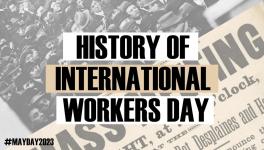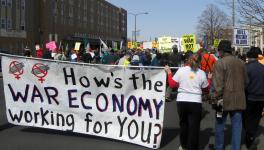Poorer People Are Wiser and More Reasonable in Personal Conflicts: Study

Image Credits: Sean Scanlon
When it comes to dealing with personal conflicts, people belonging to under-privileged classes display more wisdom than people in middle and high classes. Lacking resources, they develop a more reasonable outlook towards relationships and need for cooperation, a study, published in Proceedings of the Royal Society B, has found.
“[C]ompared to the middle class, the working class and the poor are more likely to focus on close relationships (versus individuality) and in-group cooperation (versus competition)—ecological adaptations that secure survival and success in resource-poor environments,” the study says.
Wisdom in personal conflicts means looking at an argument from the other person’s perspective, considering an outsider’s view, being sensitive to what the conflict could mean for the future of the relation, and trying to come to a compromise.
This research was led by Igor Grossmann and Justin P. Brienza from the Psychology Department of University of Waterloo in Canada. Although their findings agreed with the notion that people in high and middle classes develop better abstract cognitive skills (due to their resource rich circumstances), but they found that this does not influence wise reasoning. Grossmann said that those in the middle class tend to focus on education, which may improve their cognitive scores, but they don't put as much effort into conflict resolution skills.
The research for this paper was carried out in two studies. The first consisted of online surveys of 2,145 people in the United States. The participants were asked to recall a recent conflict and answer questions related to their response to this conflict, such as if they considered an outsider’s perspective, or if they considered they might be wrong.
The second part consisted of interviews with 199 people from a wide range of social classes, from nonworking poor to the affluent. The level of education played a major role in distinguishing a participant’s class. Apart from questioning the participants about personal conflict, the interviewers also asked them about societal conflicts. The same conclusion was arrived at for personal conflicts, that lower classes dealt with it in a wiser manner. For societal conflicts, the researchers found that the level of education had no significant impact on wise reasoning.
For under-privileged classes, the study says, less wisdom for societal conflicts is understandable as intergroup conflicts in foreign countries do not influence their daily lives. But for education to not alter mindsets in any particular direction is astonishing.
The studies also found that one’s own perception of class affects their wisdom in a similar manner. If you think you belong to high or middle social classes, you still have lower wisdom in personal conflicts. Another interesting finding was that, “one is less likely to reason wisely when the other person involved in the situation is of lower status than oneself.”
The study says that higher-class environments encourage greater amounts of self-focus. This lowers a person’s ability to look at an argument from the other person’s perspective, thus discouraging wise reasoning.
These findings, the research says in its conclusion, cannot be explained with social desirability — a response bias in survey respondents that leads them to answer questions in a way that will portray them in a favourable light. The same results occurred systematically in all aspects of wise reasoning. The results also reflect the failure of middle-class education systems to teach application of wise-reasoning in daily matters of personal conflicts.
Get the latest reports & analysis with people's perspective on Protests, movements & deep analytical videos, discussions of the current affairs in your Telegram app. Subscribe to NewsClick's Telegram channel & get Real-Time updates on stories, as they get published on our website.
























